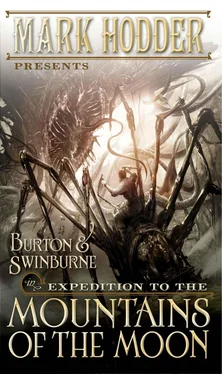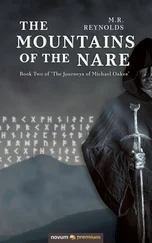Mark Hodder - Expedition to the Mountains of the Moon
Здесь есть возможность читать онлайн «Mark Hodder - Expedition to the Mountains of the Moon» весь текст электронной книги совершенно бесплатно (целиком полную версию без сокращений). В некоторых случаях можно слушать аудио, скачать через торрент в формате fb2 и присутствует краткое содержание. Жанр: sf_stimpank, на английском языке. Описание произведения, (предисловие) а так же отзывы посетителей доступны на портале библиотеки ЛибКат.
- Название:Expedition to the Mountains of the Moon
- Автор:
- Жанр:
- Год:неизвестен
- ISBN:нет данных
- Рейтинг книги:5 / 5. Голосов: 1
-
Избранное:Добавить в избранное
- Отзывы:
-
Ваша оценка:
- 100
- 1
- 2
- 3
- 4
- 5
Expedition to the Mountains of the Moon: краткое содержание, описание и аннотация
Предлагаем к чтению аннотацию, описание, краткое содержание или предисловие (зависит от того, что написал сам автор книги «Expedition to the Mountains of the Moon»). Если вы не нашли необходимую информацию о книге — напишите в комментариях, мы постараемся отыскать её.
Expedition to the Mountains of the Moon — читать онлайн бесплатно полную книгу (весь текст) целиком
Ниже представлен текст книги, разбитый по страницам. Система сохранения места последней прочитанной страницы, позволяет с удобством читать онлайн бесплатно книгу «Expedition to the Mountains of the Moon», без необходимости каждый раз заново искать на чём Вы остановились. Поставьте закладку, и сможете в любой момент перейти на страницу, на которой закончили чтение.
Интервал:
Закладка:
Burton felt ensnared by inevitability.
“What's the matter?” Palmerston asked. “Should I call a nurse?”
The explorer took his hands from his head, feeling the ridges of his tattoo sliding beneath his fingertips.
“No, Prime Minister. I have a headache, that's all.”
“Then I won't disturb you any further, Captain.” Palmerston picked up his coat, shrugged it back on, took up his top hat, and said: “We've blown hot and cold, you and I, but I want you to know that I have renewed faith in you. You've done a splendid job. Absolutely splendid! Thanks to your actions, the Empire is secured.”
He turned and departed.
Burton sat and stared into space.
A week later he was released from hospital and returned to his home at 14 Montagu Place.
Mrs. Angell, his housekeeper, was horrified at his appearance. He looked, she said, as if he'd just been dug out of an Egyptian tomb.
“You'll eat, Sir Richard!” she pronounced, and embarked on a culinary mission to restore his health. She also cleaned around him obsessively, as if the slightest speck of dust might cause his final ruination.
He put up with it stoically, too weak to resist, though there was one item he wouldn't allow her-or the maid, Elsie Carpenter-to touch, let alone dust: the rifle that leaned against the fireplace by his saddlebag armchair.
It was an anomaly, that weapon, and the image of it arose again and again in his Sufi meditations, though he couldn't fathom why.
A few days after his homecoming, a parakeet arrived at his study window. “Message from thick-witted Richard Monckton Milnes, otherwise known as Baron hairy-palmed Houghton. Message begins. I will call at three o'clock, bum-slapper. Message ends.”
The new 1st Baron Houghton arrived on time and found Burton wrapped in his jubbah and slumped in his armchair beside the fireplace, with a cheroot in his mouth, a glass of port in his hand, and Fidget the basset hound stretched out at his feet. Whatever greeting Monckton Milnes had planned died on his lips at the sight of the explorer. He stood in the doorway of the study, his mouth hanging open.
Burton removed his Manila, set down his glass, and gave a half-grin. “What you see is the much-recovered model,” he said, rising to his feet. He crossed to his friend and shook his hand. “You should have seen the state of me before! Hang up your coat, old man, and take a seat. Congratulations on your peerage. Would you prefer me to bow or pour you a drink?”
“Hell's bells, Richard! You look twenty years older!”
“I'm four years older. No, five, counting the year since you last saw me, the rest is down to the vicissitudes of Africa.”
His visitor sat down and accepted a glass of port.
“By heavens, it's good to see you again. But five years? What are you talking about?”
“It will require a suspension of disbelief on your part.”
“A little over a year ago you told me that Spring Heeled Jack was a man from the future and that history had been changed. Is what you have to tell me more incredible even that that?”
“As a matter of fact, yes, it is.”
“Ouch! Very well, fire away. You talk and I'll drink.”
Over the course of the next two hours, Burton told his friend everything that had happened in Africa, and he withheld nothing.
A long silence followed as Monckton Milnes digested the tale, along with the copious amount of port he'd gulped.
Burton showed him the rifle and pointed out the inscription on its stock: Lee-Enfield Mk III. Manufactured in Tabora, Africa, 1918.
“You have to change history,” his guest said softly.
“That's the problem,” Burton replied. “To do so I have to outmanoeuvre myself, as well as Palmerston.”
“And if you succeed,” Monckton Milnes interjected, “if you create yet another branch of history, you'll just be adding to the chaos poor Algernon warned of.”
Burton sucked at his cigar. “Not so much poor Algernon. He seemed very content with his new form. But yes, you're correct. He told me to put an end to all the divergences, despite that doing so would wipe out the history in which he currently resides. How, though, am I to do that?”
He looked down at the rifle that lay across his legs. “How am I to do that?”
Quite without warning or obvious reason, the last words Burton had ever heard Detective Inspector Honesty speak leaped into his mind with such clarity they might have been muttered into his ear: “Needs pruning, hard against the stem.”
Monckton Milnes, as Burton had requested, had spent the past year surreptitiously monitoring the prime minister. He reported that Palmerston had secretly quadrupled military spending, had reshuffled his cabinet so that it contained the most martial of his party's ministers, and was steadfastly refusing to make a decision regarding British America's slave population.
Burton thanked his friend, bade him goodbye, and spent the rest of the afternoon meditating.
That evening, he met Maneesh Krishnamurthy for dinner at the Athenaeum Club on Pall Mall. They grabbed each other by the elbows and shared a wordless greeting. Both grinned stupidly, both looked into the other's eyes, and both saw pain and loss.
They settled in the lounge and shared a bottle of wine.
“I've started on these foul-tasting things,” the police commander said, opening a platinum cigarette case and pulling forth one of the little tubes of Latakia tobacco. “Much worse than my old pipe, but I had to trade the damned thing to get out of a jam at Madege Madogo and I haven't the heart to replace it. It was a gift from my cousin, bless him.”
“I miss him,” Burton murmured. “I miss them all.”
He raised his glass in a silent toast. Krishnamurthy followed suit. They drained them in a single swallow and poured over-generous refills.
“Sir Richard, I know I look like I've been starved, beaten, and dragged backward through a thorn bush, but if you don't mind me saying so, you look considerably worse. What in blue blazes happened to you?”
“Time, Maneesh. Time happened to me.”
For the second time that day-and only the second time since he'd got back-Burton gave an account of what had occurred after he and Krishnamurthy parted company outside Kazeh.
“By James, it's unbelievable, Sir Richard, but looking at what's happening in the world today, I can easily see how it might develop into the hellish conflict you describe.”
“Unfortunately not might , but will”
They drank more. Too much. Krishnamurthy described his journey from Kazeh back to Zanzibar. Burton's head began to swim.
A concierge approached. “Excuse me, sir,” he said. “A message for you. It arrived by runner.”
Burton took the proffered note. He looked at Krishnamurthy. “This will be from Palmerston.”
“How can you tell?”
“Because the only way a runner would know I'm here is if it was sent by someone who's having me watched.”
He opened the note and read:
This morning, a military court found Lieutenant John Hanning Speke guilty of treason. He will be executed by firing squad at dawn on Friday. His final request is to see you. This has been permitted. Please attend with due dispatch. Burke and Hare will escort.
Henry John Temple, 3rd Viscount Palmerston
Burton cursed and passed the note to his friend.
Krishnamurthy read it and said, “Because he aided the Prussians?”
“Yes. But he was never acting under his own volition. From the very inception of this whole affair, Speke has been manipulated and taken advantage of.”
“Will you go?”
“Yes.”
The two men continued drinking until past midnight, then said farewell and made off-somewhat unsteadily-toward their respective homes.
Читать дальшеИнтервал:
Закладка:
Похожие книги на «Expedition to the Mountains of the Moon»
Представляем Вашему вниманию похожие книги на «Expedition to the Mountains of the Moon» списком для выбора. Мы отобрали схожую по названию и смыслу литературу в надежде предоставить читателям больше вариантов отыскать новые, интересные, ещё непрочитанные произведения.
Обсуждение, отзывы о книге «Expedition to the Mountains of the Moon» и просто собственные мнения читателей. Оставьте ваши комментарии, напишите, что Вы думаете о произведении, его смысле или главных героях. Укажите что конкретно понравилось, а что нет, и почему Вы так считаете.












